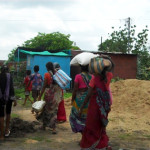Earlier this year, VV-PACS Community Correspondent Reena Devi reported on how the residents of Bihar’s Katihar district were being sold ration cards at an unfair price. In this report, she documents how she was able to make an impact by rallying against the administration with the help of community members.
Ration Cards are basically the identity and eligibility proof on the basis of which the whole Public Distribution System (PDS) works. It is an A-4 size folded paper, though the government replaced it with a microchip-installed Smart Card in some parts of the country, but those never reached in Katihar. The ones that did reach to the community, however, were being issued at 5 INR.
The government sets the bar at 2 INR. To understand the difficulties caused by this difference you have to consider that the subsidised food grains (that can only be availed by the card) worth 3 INR can feed a family twice. The card is necessary for people living below the poverty line, who mainly use it to get subsidised food items and fuel (kerosene usually) to cook.
The middlemen were trying to get some money out of people desperate to get the card. Getting the card, which should be an easy process, has become increasingly hard. Eligibility for a BPL Ration Card depends on the economic status of the family, which can sometimes take months to be determined. While the byzantine government machinery figures out whether or not the family is actually ‘poor’, people starve. Once the family is found ‘eligible’ middlemen — like in Katihar — try to make some money out of distribution. INR 3 for every card issued piles up quickly.
“I asked the people in the community to write an application about this to the District Collector,” CC Reena Devi says. It wasn’t something new to Reena — for long she has been her community’s resident activist and has often mobilised citizens for social goals. Armed with video evidence of residents testifying to the wrongdoing, along with the application signed by the residents, Reena Devi and a few others approached the District Collector for Katihar district and demanded that action be taken to provide justice to the community.
This resulted in a quick investigation and the process for distributing ration cards was reinstated at the correct price.
This is a PACS-VV video. The Poorest Areas Civil Society (PACS) Programme and Video Volunteers have come together to create the Community Correspondents Network. The videos created by the network bring out voices from the margins, providing communications skills to marginalised individuals and advocacy tools to community-based organisations.
Better Texas Wagering m pana365 login Websites an internet-based Sportsbooks in the 2024
A great statewide cellular system might possibly be a necessity to own revenue achievement in a state as the huge since the Tx, but officials may be politically reluctant to make it betting beyond a good select few parts. Closest to some of Tx’ most west metropolitan areas such Amarillo,...
Best Brokerage Accounts for Trading: 2024 Finest Selections
Another way away from thinking about one, but not, is that a broker account resting laden with uninvested bucks isn’t vulnerable to and make hardly any money sometimes. You need to use tips for example advantage allotment and you can variation to reduce the possibility of you losing profits, but...

